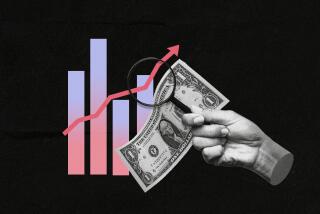Affluent Baby Boomers May Face Financially Bleak Old Age
WASHINGTON — The nation’s baby boomers may be facing a bleak retirement 15 to 30 years from now, despite their legendary ability to afford luxury cars, condominiums and the like.
A study by the Urban Institute shows that, although Americans in the 33-to-50 age bracket started adult life financially better off than their elders did, they have not amassed nearly as much wealth as their parents had at their age.
As a result, baby boomers are going to have to start saving more soon--and spending far less--or they won’t be able to retire as comfortably as their parents have or to provide as well for their own children.
“There are those (baby boomers) who are making ends meet but neither they nor their employers are putting money away for retirement,” said Peter A. Morrison, a RAND Corp. demographer.
THE PROBLEM: Even those boomers who started their working lives with comfortable salaries lag behind other age groups in terms of net wealth. Although a person’s total wealth, or net worth, may continue to grow during a recession, his or her income may stagnate--or drop. And the fact that boomers switch careers more frequently also tends to keep their incomes in check.
“The only way their wages grow (faster than inflation) is by adding a second earner, a wife,” said New York University economist Edward Wolff.
There are also other factors.
The nation’s sagging housing market has hurt baby boomers, economists say. Housing used to be a safe hedge against inflation for middle-class Americans. Even if inflation soared, house prices invariably would keep pace during periods of high demand.
And couples could use the nest eggs they acquired from their home equity to help finance their retirement.
But the RAND Corp.’s Morrison said that, although those who are buying homes now will see some appreciation in house prices, it would not be enough to create a nest egg for retirement.
“Where we used to think exclusively in terms of housing ‘haves’ and ‘have-nots,’ now we should also think about the pension ‘haves’ and ‘have nots,’ ” he said.
At the same time, the squeeze in the federal budget is likely to leave baby boomers with relatively smaller increases in Social Security and Medicare benefits.
And, because baby boomers are having children at a later age, they may still be educating or supporting children at age 50, when other generations of Americans traditionally have been able to save more for their retirements.
Which baby boomers will be hit hardest?
Urban Institute economists Richard C. Michel and Frank Levy say those without college degrees will have the hardest time planning for retirement, partly because they will be more dependent on a volatile housing market.
And William Apgar, a professor at Harvard’s John F. Kennedy School of Government, said that renters “devote more money for housing than their counterparts, and that’s eating into the potential savings of that group.”
POSSIBLE SOLUTIONS: But there may be other opportunities for the baby boom set:
--Recent changes have increased to $600,000 the amount a parent may bequeath tax-free, while other laws enacted in the 1980s make investing in individual retirement accounts and employer-matched 401K plans a popular way of decreasing pre-tax income.
Boomers who have wealthy parents, or who themselves have enough disposable income to take advantage of retirement tax breaks, stand a better chance of outdistancing inflation.
--Baby boomers will inherit an average of $50,000, according to current estimates. Although using that to buy a first home is still smart, NYU’s Wolff notes that the same money, wisely invested in other ways, could yield $500,000 within 30 years.
And the best way to invest an inheritance may be through a pension plan, Wolff and others advise. Salting money away in IRAs and 401K plans is the wave of the future in terms of wealth accrual, they say.
More to Read
Inside the business of entertainment
The Wide Shot brings you news, analysis and insights on everything from streaming wars to production — and what it all means for the future.
You may occasionally receive promotional content from the Los Angeles Times.










